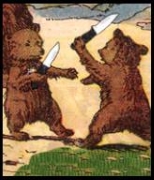|
Baller Ina posted:-Is it a problem if the campaign is fairly linear? The plot will have the party on the move most of the time, heading from place to place driving off invading forces trying to steal magical macguffins. I figure there will be a little breathing room at time, like an NPC says "the next assault will be at [CITY] in ten days, make sure you're there" and so the party has a day or two of in-game time to pursue sidequests or whatever. Otherwise though the campaign will be on-rails and I'd like to know if this is an issue. Obviously I can make the journey not be empty with road encounters and such, I'm just asking from a freedom of movement perspective. My approach when writing settings is to write the characters and the setting as it is and try not to anticipate what the players will do. The whole point of having a GM and not playing a video game is that the GM can respond intelligently to the things players do, they're not tied down to a prewritten story. Like, if you've written a whole plot arc about the villains stealing these artefacts piece by piece and the players turn around and say "You know what, let them have those useless pieces of junk, those rear end in a top hat nobles had it coming anyway" then all the work you've done is ruined -- but if you've spent your time figuring out what the villains want the pieces for and what their plans for the kingdom are, then you can roll with the punches and make the plot instead be about living under the villains' thumb and running desperate sabotage missions to disrupt whatever they wanted the artefact for in the first place.
|
|
|
|

|
| # ? Jun 11, 2024 23:04 |
|
Making factions and their goals is such good advice and I'd really let that slip in my current campaign, I spent a looot of effort making plots. Fortunately I have a well developed sense of the factions, so i should really just relax, which is great because I was feeling the strain of being the GM latley.
|
|
|
|
So kind of related to this. I've been struggling a little with getting my campaign to move along at a decent pace. Part of the issue is the rules system (Pathfinder) with battles taking a chunk of each session but I've been feeling that even sessions without combat moves really slowly. My kneejerk reaction is to start plotting poo poo to bring to the table. But that means laying down rails and taking away a little player agency with regards to campaign direction. I'm currently using a Apocalypse World inspired planning style, working with actors and factions trying to have them react or act based on party actions and own motivations rather than a A-B-C plot structure. Any advice on keeping the action and the plot moving when using the sort of actor-based planning people have been suggesting?
|
|
|
|
What exactly are you finding is taking up the time? Players debating the course of action to take, looking up rules, or something else?
|
|
|
|
SafetyTrain posted:Any advice on keeping the action and the plot moving when using the sort of actor-based planning people have been suggesting?
|
|
|
|
And make a list of things that might happen, good, bad and funny, and drop them in when the game is flagging
|
|
|
|
Whybird posted:My approach when writing settings is to write the characters and the setting as it is and try not to anticipate what the players will do. The whole point of having a GM and not playing a video game is that the GM can respond intelligently to the things players do, they're not tied down to a prewritten story. This is fair, but at the same time if my group suddenly just nope'd out of helping the NPCs with no good reason why(like, say it's more the commonfolk needing assistance than some snooty nobles) I'd be a little annoyed. Now if the NPCs were played as a little standoffish and disrespectful, the party souring on them would be expected and I'd be ready for that. It reminds me of when people say they want to play a reluctant PC, the answer usually is "the party isn't obligated to twist your arm, they'll just leave without you". By the same token if I the DM set up a pretty normal scenario and the party wants to struggle against the plot as hard as they can the solution seems to be to just try something else because they clearly don't like the adventure. I guess that's where an open dialogue would come into play. Also for the folks recommending building more of a world with factions and hubs of activity, woof, that sounds even harder. Part of a pre-written campaign is it sort of takes place in an isolated bubble-you visit the cities involved in the story, and the DM can fill in the rest of the world's activity at their leisure. Although that is somewhat what the whole thing would have resembled, I suppose; getting to the three different temples to repel assaults can't really carry 100% of the campaign's content and I already had a couple side adventures planned. The various advice has made me rethink stuff a bit and I'm already thinking of a way or two to add some player agency so that's cool.
|
|
|
|
One of the dirty little secrets of effective GMing is that the best GMs, the ones who seem to have command of an entire world, with deep lore at their fingertips and NPCs lovingly crafted for every possible situation and multibranching story paths so that they're never caught off-guard by the PCs' actions? Those people are faking it at least 2/3rds of the time. Build out a bunch of your setting and a bunch of NPCs and then just improvise. It's fun!
|
|
|
|
DivineCoffeeBinge posted:One of the dirty little secrets of effective GMing is that the best GMs, the ones who seem to have command of an entire world, with deep lore at their fingertips and NPCs lovingly crafted for every possible situation and multibranching story paths so that they're never caught off-guard by the PCs' actions? Those people are faking it at least 2/3rds of the time. But keep notes lest you be rumbled when a player is vocally impressed about how you foreshadowed this right from the beginning and you have absolutely no idea what she's talking about.
|
|
|
|
Elector_Nerdlingen posted:But keep notes lest you be rumbled when a player is vocally impressed about how you foreshadowed this right from the beginning and you have absolutely no idea what she's talking about. I have found that ďah, not so fast!Ē or ďare you sure?Ē disarms some of those cases where a player is tracking my narrative more attentively than I am.
|
|
|
|
DivineCoffeeBinge posted:One of the dirty little secrets of effective GMing is that the best GMs, the ones who seem to have command of an entire world, with deep lore at their fingertips and NPCs lovingly crafted for every possible situation and multibranching story paths so that they're never caught off-guard by the PCs' actions? Those people are faking it at least 2/3rds of the time. The best thing to do as a gm who always whiffs it, is when the players do something really cool, tear a few pages out of your notebook and throw them away, I've only had one player notice they're blank.
|
|
|
|
Elector_Nerdlingen posted:But keep notes lest you be rumbled when a player is vocally impressed about how you foreshadowed this right from the beginning and you have absolutely no idea what she's talking about. The most fun part of DMing for me is figuring out how to tie all the random poo poo you threw at the PCs at level 2 back into the story so they really do think youíve been planning this all along and youíre a genius. In my experience, thatís actually easier to do if you donít have a plot in mind from the start and can weave it all together after itís already happened.
|
|
|
|
Kaiser Schnitzel posted:It’s even worse when DMing with the benefit of wine and you start making poo poo up and don’t remember what the hell you were thinking next session. Luckily my players keep good notes in a google doc and so I can look and see what seemed important to them and run with that. Same, but beer. Wine makes me sleepy. I'm not writing a plot and I'm drat sure not doing any foreshadowing. I'm just putting in loads of cool and paying attention to what you're interested in and the result is indistinguishable.
|
|
|
|
Baller Ina posted:Also for the folks recommending building more of a world with factions and hubs of activity, woof, that sounds even harder. Also, you don't need to fully flesh anything out. Paint in broad strokes, friend. Sometimes just a faction name, one detail, and its main driving goal is all you need: The Kingdom of Halleth seeks to reclaim its lost glory - largely through the common and practical use of necromancy. The Principality of Grish - a multi-ethnic but mono-theistic theocracy that views necromancy as anathema. The Hadrosh'Va - a cabal of demons from the netherworld who feed on pain and misery, who are licking their chops at all the blood about to be shed by the Hallethi and the Grishna and who are doing everything in their power to widen the conflict. Check, check, check. This outlines the major players in the setting and gives some ideas as the the central themes/conflicts. Awesome, now you're ready to throw some PCs into the mix and see what happens. Then, as the game progresses (and this starts the first time a player asks you a question), add little bits as you go. But here's the trick that will make this easy - do what makes sense. It's called the Kingdom of Halleth for a reason - there must be a king. One of your players wants to be his disaffected nephew. Sweet, so let's flesh out the king a little bit: who is that guy, what's his deal? Is he the head necromancer? If so, is that how he got to be king? If not, who is the head necromancer? Oooh, or better yet, there's a coven of 13 faceless wizards who "advise" the king on all things necromantic, and it's these guys (or ladies? or both? or neither?) who are the real power in Halleth. Now you've created another faction - what's their main driving goal? And so on. With a little practice it becomes very easy to just keep tacking stuff on, and if you can loop new factions back into the goals and motivations of existing factions, things start to feel really cohesive. Once you have a handle on your main factions, making interesting and memorable NPCs is a snap: they probably share their faction's goal, but give them a little twist - this guy (gal? thing?) is one of the aforementioned Necromancers and shares their goals, but worries their means are treading dangerously close to the "not being justified by the ends" category, so he (she? it? they?) is holding back or expressing hesitancy or subtly self-sabotaging. And the best part is that you don't need to make up this NPC or anything about them until the moment they appear "on-screen" - and even then they don't have to be fully-formed. It's totally cool to lie awake in bed long after the session is over and everyone has gone home and think to yourself, "OK, so why did that NPC take the action they took in that scene?" You're still all hopped-up on Mountain Dew and not getting to sleep anytime soon anyway, so do something useful with your chemically-induced insomnia. Let's call this: "make haphazard dots, connect them later." And listen to your players, as they will often make those connections for you, and they're usually better than what you'd have come up with anyway: "Do you think Magos Faryk has gone rogue? Why else would he (she? they?) be asking us to surreptitiously neutralize the Coven's mole in the King's Guard? Oh, poo poo, I'll bet this is preparation for a palace coup!" Just like that, you're off to the races - and it didn't take you days or weeks coming up with the whole setting and all the NPCs beforehand. It takes a little practice, but I find the end result to be a much more satisfying experience for everyone involved, including me as the GM. Ilor fucked around with this message at 05:21 on May 18, 2019 |
|
|
|
An example of how framework-oriented minimal planning can work: Let's say you've decided to base your campaign out of the Free City of Exampleopolis, and you have this vague idea that you want your PCs to foil the plans of the cult of the Dark God Tyrannicus. Okay, cool. Here's how you fill that in. You come up with, say, five or six Important Figures who represent and lead various factions in the city, like so: High Priest Bob, head of the Temple of Genericus, the main local 'good guy' deity. Master Trader Pleaseavoidstereotypes, head of the largest merchant coster in the area. Earl Notnamedfortea Grey, ruler of the Free City whose health is failing. His main advisor and power behind the throne, Vizier Mustachetwirler. His eldest daughter and presumed heir, Lady Notyourloveinterest. A powerful wizard, Gandalfwasawuss, who mostly just wants to be left alone to do experiments and such but keeps having to deal with, you know, politics. Okay, cool. Now you have a framework. Now you come up with a rough idea of some task that each of these important people might have for a party of adventurers - the High Trader wants them to stand guard at the docks because he's heard there might be someone trying to steal a shipment he has coming in, the Earl wants them to clean out a goblin infestation in the city's poor quarter, and so on. The catch is that every single one of these adventures will feature, at some point, the PCs catching sight of a shadowy figure that seems to be directing whatever bad guys they come across, and who flees; if/when the PCs follow him, he leads them to a hidden temple to Tyrannicus, setting the PCs at odds with the cult (this way you only have to draw one Hidden Evil Temple map, you see). Now... one of your Important NPCs is in league with the cult, because of course they are, who has a story about evil cults that doesn't involve someone rich and powerful working with them to undermine the forces of good? So... which one is it? Here's the cool part. You don't have to know that yet. Any one of them could be a secret cultist (okay, maybe not Bob - but he could be bankrolling the cult in an attempt to scare the populace so that more of them start going to church to seek protection from Tyrannicus), but you don't have to decide who it is yet. Wait for the PCs to decide they really hate one of the NPCs, then make that guy the secret cultist. Or, if you're feeling mean, wait for the PCs to decide they really like one of the NPCs, and have that guy be the secret cultist. Regardless, you pick the NPC that will have actual emotional impact for the players - and they will show you who that is in the course of play. So what you have here, in this framework, is minimal work that will present you, over time, with a wealth of opportunities. Maybe the PCs take a shine to one of the NPCs and decide they want to help them out, to increae the power and prestige of their faction of supporters in the city; hell, maybe they mostly ignore your improvised plot hints and say "gently caress this, we're gonna open a tavern," which is cool, but you can sit back and say "I wonder how the wizard will react when his apprentices decide the PCs' new tavern is their new favorite watering hole" or "I wonder if they might get an offer to stock a particular ale that the Vizier secretly loves" or whatever. Maybe the PCs play nice and decide to exterminate the cult - who do they go to for help and support and intel? Any of the NPCs will work, after all. By building a loose framework, without any rigidly-defined sense of who the PCs must work for or who the PCs must hate or whatever, you avoid the most common pitfalls of GMing, where you've built load-supporting ideas in your campaign that the PCs will inevitably knock over.
|
|
|
|
Don't forget the classic one of giving the players two locations for next session and then having both lead to the same encounter, just with different wallpaper. Eg: Either the docks or the ruins in the jungle. Both lead to the same encounter with pirates because the ruins are the pirates secret lair. Well done players, I'm glad you figured it out based on the clues I laid out for you! (you didn't do any clues) Baller Ina posted:This is fair, but at the same time if my group suddenly just nope'd out of helping the NPCs with no good reason why(like, say it's more the commonfolk needing assistance than some snooty nobles) I'd be a little annoyed. Now if the NPCs were played as a little standoffish and disrespectful, the party souring on them would be expected and I'd be ready for that. It reminds me of when people say they want to play a reluctant PC, the answer usually is "the party isn't obligated to twist your arm, they'll just leave without you". This shouldn't happen. You talk to the players before you come up with anything and say that you're going to do a thing, are they interested in helping out the commonfolk and if they say no then you do something else. If they say yes and then nope out of helping them you tell them they're jerks for saying they wanted to do that and that you don't have anything else prepared so let's meet up again next week. No one minds being railroaded if they bought tickets. Reluctant characters are fine as long as everybody knows that, no matter what, they're joining in and they're not going to leave. You make that very clear by saying "hey, I get you want to play a reluctant character, but you're here to play a game and you're joining in, this is non-negotiable" and then you ask what it'll take for the character to join in and why that can't be a thing that's already happened. If everyone ends up happy then the guy's house/dad/dog/heirloom can explode in the first session or whatever the agreed upon call to action is. Asking the other players if they want to have a scene where they 'convince' the character to join is fine too, it can create a nice dynamic to a party if the cleric/fighter/wizard gave a rousing speech to bring them all together and nobody has to try too hard to convince because we all know they're going to say yes and join in. I play with someone where 99% of their characters want to escape. They either ended up in the initial situation of the campaign because they were running from something or they just want a nice quiet life. The group ask the question "your character runs from things, why are they not running from this? What's special that's keeping them involved this time?" and then they think about it for a bit and come up with a rad reason and then we all have a nice time. Just part of the process I guess!
|
|
|
|
Baller Ina posted:This is fair, but at the same time if my group suddenly just nope'd out of helping the NPCs with no good reason why(like, say it's more the commonfolk needing assistance than some snooty nobles) I'd be a little annoyed. Now if the NPCs were played as a little standoffish and disrespectful, the party souring on them would be expected and I'd be ready for that. It reminds me of when people say they want to play a reluctant PC, the answer usually is "the party isn't obligated to twist your arm, they'll just leave without you". By the same token if I the DM set up a pretty normal scenario and the party wants to struggle against the plot as hard as they can the solution seems to be to just try something else because they clearly don't like the adventure. I think my point is that it's difficult to predict what is going to motivate your players into action. As a player, if a GM had this really obvious plot-relevant NPC come up and be all "Hello, I have an important quest for you" then I'd probably take the hint and if there was some in-character reason my character would get cold feet about it (like, the NPC is a noble and my character is a rabble-rousing revolutionary) I'd figure out some way to get around it, 'cos working with your GM is part of playing a communal game. But I'd have an even better time if I knew that I could make other choices, like pretending to go along with the noble's plan and betraying him at the last minute for double the pay, without derailing the plot my GM had intricately planned out.
|
|
|
|
Whybird posted:But I'd have an even better time if I knew that I could make other choices, like pretending to go along with the noble's plan and betraying him at the last minute for double the pay, without derailing the plot my GM had intricately planned out. Note that there is a particular type of player for whom "derailing the plot my GM had intricately planned out" is a feature and not a bug.
|
|
|
|
DivineCoffeeBinge posted:Note that there is a particular type of player for whom "derailing the plot my GM had intricately planned out" is a feature and not a bug. Alright, so DM question time. A new player was introduced to our group about six months ago, and she'd never played any tabletop game before then. Things have been going well, and she has really come out of her anxious and shy behaviour from the first few sessions and engaged in role playing and party decisions. One thing I like doing with my players is having them flesh out something of my setting and making some side stories based on their backgrounds. When she first joined, she told me in private that she did not want to have the spotlight on her like that, that she was uncomfortable with it, etc. Of course I did as she asked, but now that I've seen her grow as a player I'm wondering if I should try and include something for her character. I wouldn't just surprise her with it in game, I'd ask her privately if it were okay and give her my reasons for it, that she seems more comfortable with the group and rolepalying, etc. Would this be a good idea? What sort of approach should I take with this, since she has had issues with anxiety in the past? Like I said, I'm not keen on just dropping it on her in the middle of a session, it would be hashed out with her beforehand to make sure she's okay with it. But I am cocnerned that maybe I will send her the wrong sort of message and unintentionally suggest she must do these things.
|
|
|
|
I think a lot is going to be up to the way it's phrased. I think you're likely to get a lot more traction from something like, "Hey, so I've also seen you really develop your character in some interesting ways, and I'd like to run with some of those ideas as I think it might make for an interesting story arc. I know you initially said you wanted to stay out of the spotlight and I'm cool with that if it's still the case, but is that something you'd be interested in?" Then give her some options and assess her comfort level with them. Also, for whatever reason, the break between player and character can be really helpful here for some people - if you make it clear that it's spotlight focused on the character rather than the player, sometimes even really shy people will surprise you with their level of participation.
|
|
|
|
Ilor has the right of it; have the chat with the player, respect their boundaries, and make it clear you're trying to spotlight the character, not the player. Make sure there's no pressure on her; emphasize that even though the character will be taking center stage, the other characters are still going to be there and pitching in to the overall story - which means the other players will be doing things, not just sitting back watching her. Beyond that, if she says yes, cool, run with it. If she says no, respect that and move on.
|
|
|
|
as a DM who likes to do a lot of prep work i thought I'd share my take on writing a plot for a campaign. im currently running a hex crawl that takes place on a large island. the players are gated off by a major plot contrivance (that keeps them from leaving the island) and there are 3 more plot contrivance gates that they are currently working through (1. lack of a sea travel option, 2. a large-scale illusion that they aren't yet able to see beyond, nor do they realize it's an illusion, and 3. what is essentially the magic shield surrounding the bbeg's castle, preventing would-be heroes from interfering). So this breaks the entire map up into 4 distinct stages of exploration--ie, the map opens up gradually as the party progresses. Each hex in each subset of the map can be explored, and each hex will contain either a town, a (usually delve-length) dungeon, or a role-playing event. on top of this, during travel the party runs the risk of random encounters. but instead of random combat encounters, they are facing scripted encounters (and not always combat encounters) that play out a little side story in parts. towns are generally safe, and towns are where your adventure hooks live, and those will lead players to the wilderness in search of dungeons. while searching for the dungeons, players will stumble into "random" encounters that play out as little Worldbuilding side stories or supplementary information, or a role-playing event that lets us all get to know the characters better, sometimes also revealing something more about the world (eg, the party finds a prisoner who escaped from Orc Dungeon. this lets them make an ethical choice about what to do, lets them speak in character to an NPC and to one another, and lets them know that Orc Dungeon is somewhere around here. Hey, that guy in town was asking about Orc dungeon!). Eventually they will get to a dungeon delve. I have them spread out on my map in such a way that they can't move too far in any direction without eventually bumping into one. The dungeon delves are short 5-room dungeons that add flavor to the world and have simple storylines or clues that tie them to setpiece dungeons. setpiece dungeons are the big fuckoff dungeons that take multiple sessions to clear, and each explorable area of the map has the storylines of all their locations interwoven in such a way that the players are eventually funneled towards the setpiece dungeon. The setpiece dungeon is where the plot happens that will at least let them know how to make the explorable area of the map bigger. im not forcing my players to do anything, but i want them to at least have the facts if they want them. Since each explorable area funnels the players to a setpiece dungeon, i can use the setpiece dungeon to tell my "main" story and then use all the extra locales, encounters, and quests to build the world and add complexity to the central plotline. tldr: there are ways of writing for an rpg that can still leave a lot of room for player freedom. If this is dumb, or makes no sense, give me a 6er
|
|
|
|
That's a sensible way of writing, imo, sounds a fun campaign. Personally I'd be open to shuffling stuff round behind the scenes if they luck out of Finding the Fun, but having a structure like that would make it effortless so that's fine.
|
|
|
|
I think that's a much more reasonable idea than writing it scene-by-scene. (I get hot springs island vibes which is an island hexcrawl module that I quite like the sound of, not having run it.) I do think that like, if your players don't end up much caring for a faction or some other element of a set piece dungeon, well before they ever reach said dungeon, then it may be worth reworking. Implicit player feedback is valuable and your set piece will be much more appealing if it involves the fate of a group the PCs have shown they care about.
|
|
|
|
yeah to both of the above, a lot of tweaking on the fly and between sessions happens to keep things smooth, and a lot of the random events have only a 1 or 2 line description since my improv chops have gotten decent over the years
|
|
|
|
Next session we'll see whether my players can see when it's a time to run away. They fought what's referred to as a Black Skeleton last session, charred bones and a far more keen and cruel intellect than normal skellies. Gave them a good smacking, especially the poor Bladesinger Wizard with 17 HP. There's a certain room on the next floor that has six of them at once... Now I could reduce the number. They are Level 4(ish) and these things are CR 4. 2-3 would be a hard or deadly encounter. But part of me wants to just let the encounter happen, however fully above the table tell them "This is the part where you run for your lives" if they don't get it in a round. I think I won't be bunching all six of these things into a single initiative either, bit of a PITA on my end but it gives them more of a chance to get away.
|
|
|
|
Arthil posted:Next session we'll see whether my players can see when it's a time to run away. To build a fail safe in you could make a clearly visible trim of black obsidian at the threshold and have it glow with arcane power when they move inside. When they run, have one Skelton chase them but fall apart once it crosses the threshold.
|
|
|
|
Ceros_X posted:To build a fail safe in you could make a clearly visible trim of black obsidian at the threshold and have it glow with arcane power when they move inside. When they run, have one Skelton chase them but fall apart once it crosses the threshold. A good option. The way it gets triggered is they open a specific doorway into another room. This opens a secret door the skellies are chilling behind. I'd probably put that close to the entrance. Not sure anything is gonna save their asses if they open the secret room with 21 ghouls and 6 ghasts in it though. They really weren't kidding when they said this next level is Tier 2.
|
|
|
|
A friend asked if I knew of an RPG system that could do a good harlequin romance novel and I drew a blank. Weíre playing Monsterhearts so she brought that up as a possibility with some thematic tweaking, and I mentioned the Telenovela PBTA game, but it seems like there should be something closer. Anyone aware of anything? The other thought I had is that it would make a great Fiasco playset, but a bit of googling didnít turn anything up. Is there one I missed?
|
|
|
|
Fate?
|
|
|
|
Fate's pretty great for genre emulation if you work at it and everyone's on board. I don't know enough about the genre to help you out, but fate with players encouraged to select genre staples as aspects should work for just about anything. (I've done slasher movies in Fate with players explicitly taking "the drug user" "the sporty one" "the final girl" etc as aspects, essentially saying "here's how I want my death to go", and it works fine - the fun in the genre isn't in wondering who will survive, right? It's in the dumb cliched genre roles). Elector_Nerdlingen fucked around with this message at 10:45 on May 24, 2019 |
|
|
|
Ghosts of Saltmarsh is looking pretty good.
|
|
|
|
I got it yesterday and it's great. I was trying to read it sneakily but my wife caught me and took it away until we're on holiday the week after next  Edit: actual question, we had a bad session on Wednesday, first time it's happened. I wasn't on form, I'd planned in a rush and my ideas for the dungeon they're in weren't fleshed out enough. It dragged and got pretty boring, and we broke up half an hour early. I've written some notes on "what I should have done" - what would have made the rooms more interesting, different routes I should have gone in social interactions, and a bit where I wasn't thinking fast enough and overruled a player, actually he was right and I could have rolled with it and still got to where I wanted. Question is, should I share these notes with the players? They have been magnanimous with saying they weren't feeling it either, it's no-one's fault, etc but it was definitely down to me. I'd like to show I'm bothered by it and taking it seriously! Sanford fucked around with this message at 11:19 on May 24, 2019 |
|
|
|
sebmojo posted:Ghosts of Saltmarsh is looking pretty good. I did a light skimming, so maybe I missed it, but is there any word on whether they fixed the ship combat? I recall the UA was a mess of awful statblocks and oversights like "no boarding rules."
|
|
|
|
Thereís a nameless Kenku pickpocket thatís been following my party around causing mischief and is more than likely going to be involved in the main story somehow. So far, heís only spoken in cat meows, quotes from his now-killed bandit captain, and Quran passages (As spoken by our Shariah-abiding Paladin). Is there an onomatopoeia that would work not only as a name, but as a subtle foreshadowing for a future story element? Something like ďCricketĒ being a creaky door opening
|
|
|
|
Keen? Foreshadowing a supernaturally cold wind?
|
|
|
|
A kenku in our group went by Clash. May be appropriate?
|
|
|
|
Players didn't actually get to the level I was worried about! Seems a fight with three wererats, two named/special wererats and swarms of giant rats is one hell of a battle.
|
|
|
|
Asking anyone who has experience with play by post forum games, I have no experience with this but I started my first one a couple of days ago here. It's going okay so far, but I was wondering how long is it normal to wait for all of your players to post? I don't think any of my players have taken too long but it's been a day since one of them posted and it got me thinking about what to do in the future if I get a no-show player, or how long it even takes to be considered a no-show.
|
|
|
|

|
| # ? Jun 11, 2024 23:04 |
|
PinheadSlim posted:Asking anyone who has experience with play by post forum games, I have no experience with this but I started my first one a couple of days ago here. It's going okay so far, but I was wondering how long is it normal to wait for all of your players to post? I used to do a lot of PbP games, when the GM recruits it is usually good to put your expected posting frequency in the recruitment thread, and also to communicate that if you're going to be unable to post that you communicate it to the group. "Hey going camping with no cellphone signal for a week" and hopefully what their character would do is known or explained. If someone flakes you could recruit a new player (you determine how long of an uncommunicated absence is too long) to play them for a bit till you can exit their character and introduce a new one. You could also kidnap, fake kill, real kill, etc their character.
|
|
|


































